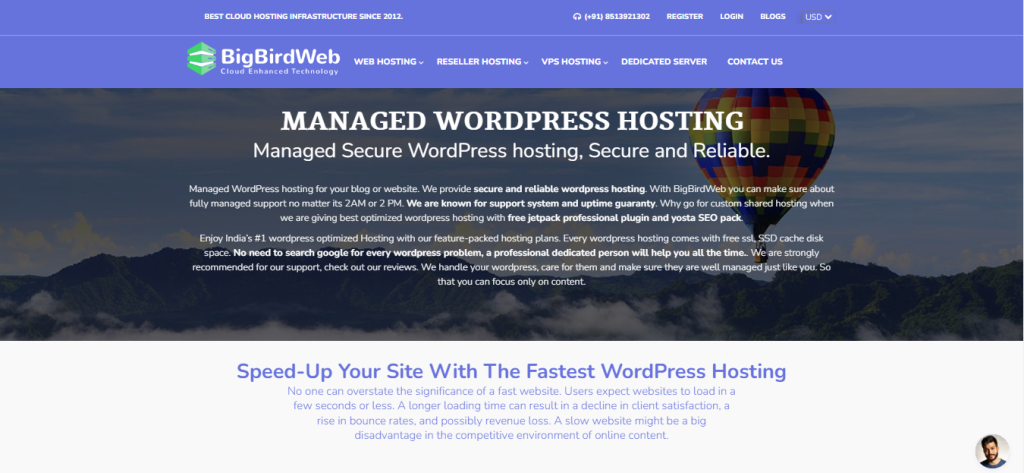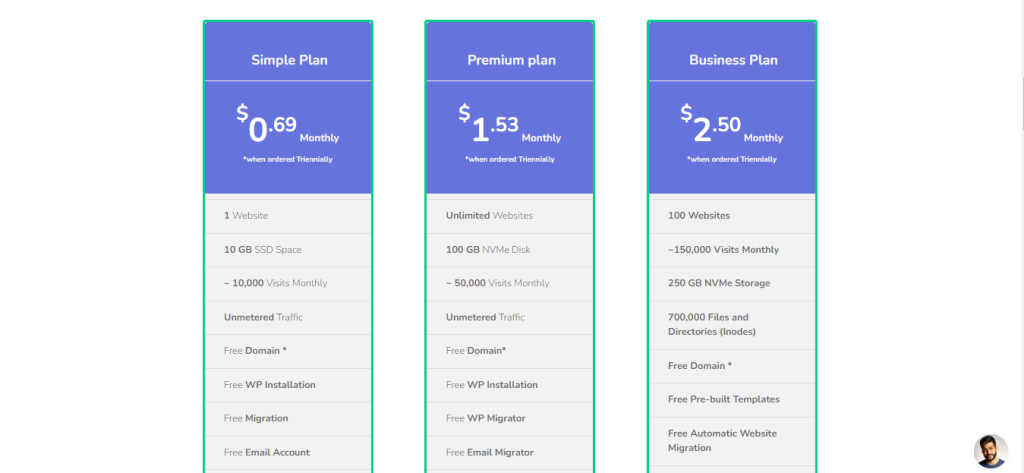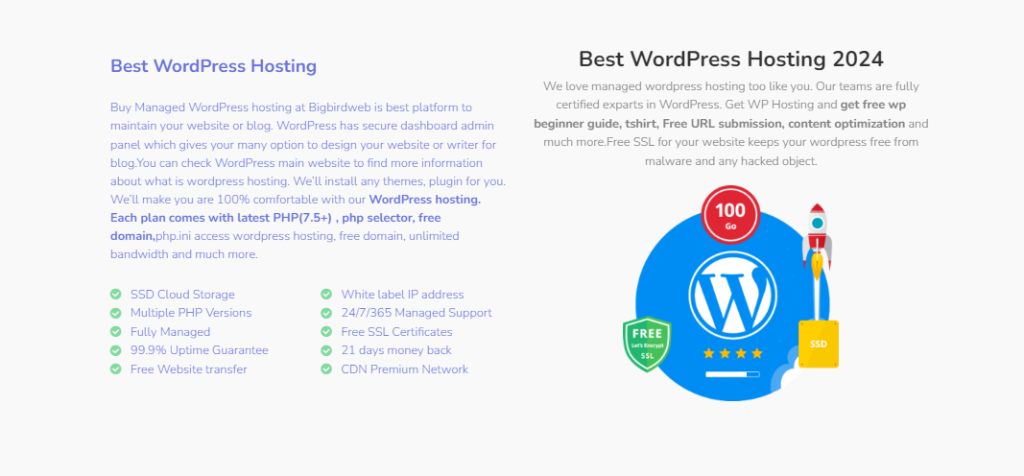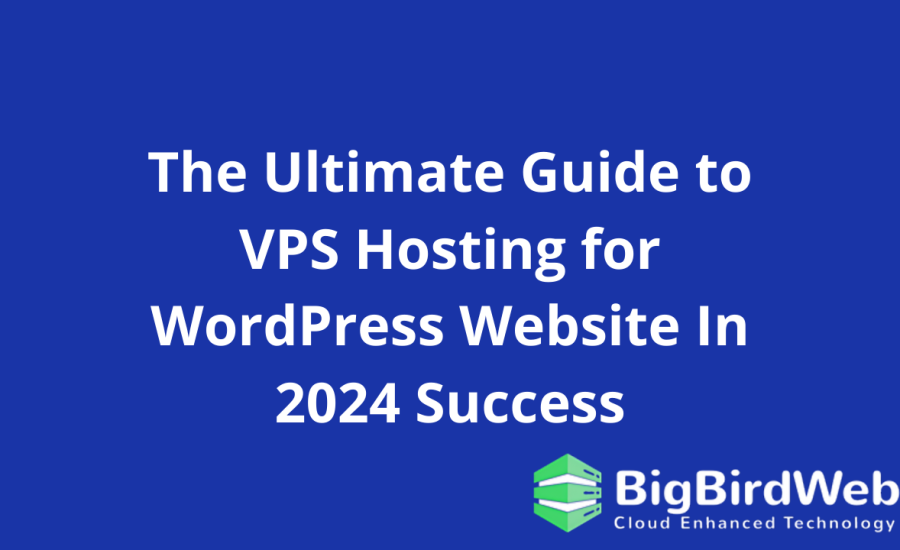VPS hosting for WordPress website is an excellent choice for users seeking more control, reliability, and performance compared to shared hosting. This guide will walk you through the essentials of VPS hosting for WordPress website, its benefits, and how to optimize your WordPress website on a VPS.

Table of Contents
What is VPS Hosting?

VPS hosting for WordPress website offers a virtual private server, which provides more resources and flexibility than shared hosting. Unlike shared hosting, where multiple users share the same server resources, VPS hosting for WordPress website gives you a dedicated portion of a physical server. This means you have more control and stability for your WordPress website.
Why Choose VPS Hosting for Your WordPress Website?

- Enhanced Performance
With VPS hosting for WordPress website, you benefit from dedicated resources, including CPU, RAM, and storage. This ensures that your WordPress website runs smoothly, even during traffic spikes. Unlike shared hosting, where resources are shared among multiple sites, VPS hosting for WordPress website provides consistent performance. - Increased Control
VPS hosting for WordPress website offers root access, allowing you to customize your server environment. You can install software, configure settings, and manage security according to your needs. This level of control is essential for advanced users who need specific configurations for their WordPress website. - Scalability
As your WordPress website grows, you may need more resources. VPS hosting for WordPress website allows for easy scalability. You can upgrade your resources, such as CPU or RAM, without significant downtime or migration hassles. This flexibility ensures your WordPress website can handle increased traffic and workload. - Improved Security
VPS hosting for WordPress website provides a more secure environment compared to shared hosting. With dedicated resources, your WordPress website is isolated from other users, reducing the risk of security breaches. You can also implement custom security measures to further protect your site. - Cost-Effectiveness
While VPS hosting for WordPress website may be more expensive than shared hosting, it is often more cost-effective than dedicated hosting. It offers a balance of performance, control, and cost, making it an ideal choice for growing WordPress websites. You can also opt for free web hosting.
Choosing the Right VPS Hosting Provider

Selecting the right VPS hosting provider is crucial for optimizing your WordPress website performance. Consider the following factors when choosing a provider:
- Reliability and Uptime
Look for a VPS hosting for WordPress website provider with a strong track record of reliability and uptime. Ensure they offer a Service Level Agreement (SLA) that guarantees a high level of uptime, typically 99.9% or higher. - Performance and Speed
Evaluate the provider’s server performance and speed. Choose a provider with high-performance hardware, fast SSD storage, and a robust network infrastructure to ensure optimal performance for your WordPress website. - Support and Customer Service
Excellent customer support is essential for addressing any issues that may arise. Choose a VPS hosting for WordPress website provider that offers 24/7 support through multiple channels, such as live chat, phone, and email. - Scalability Options
Ensure the provider offers flexible scalability options. You should be able to easily upgrade or downgrade your resources as needed to accommodate the growth of your WordPress website. - Security Features
Check for security features such as firewalls, DDoS protection, and regular backups. These features are crucial for maintaining the security and integrity of your WordPress website.
Setting Up Your VPS Hosting for WordPress Website
Once you’ve chosen a VPS hosting provider, follow these steps to set up your WordPress website:
- Provision Your VPS Server
After signing up with your chosen provider, provision your VPS hosting for WordPress website server. Select the operating system (e.g., Linux or Windows) and configure your server resources based on your WordPress website needs. - Install the Necessary Software
Install the necessary software for your WordPress website, including a web server (e.g., Apache or Nginx), a database server (e.g., MySQL or MariaDB), and PHP. Most VPS hosting for WordPress website providers offer one-click installations or detailed guides for setting up these components. - Secure Your Server
Implement security measures to protect your WordPress website and server. Configure firewalls, disable unused services, and set up SSH key-based authentication for secure access. - Install WordPress
Download and install the latest version of WordPress on your VPS hosting for WordPress website server. You can do this manually by downloading the WordPress package from the official website and following the installation instructions or use a one-click installer provided by your VPS host. - Configure Your WordPress Website
Once installed, configure your WordPress website by setting up essential plugins, themes, and security settings. Customize your site’s appearance and functionality to meet your needs. - Optimize Performance
Implement performance optimization techniques to enhance your WordPress website. This includes setting up caching, optimizing images, and configuring a Content Delivery Network (CDN) to improve load times. - Regular Backups and Monitoring
Set up regular backups to protect your WordPress website data. Use monitoring tools to keep track of server performance and resource usage, ensuring that your site remains stable and efficient.
Managing and Maintaining Your VPS Hosting for WordPress Website
Effective management and maintenance are essential for ensuring the ongoing performance and security of your WordPress website.
- Regular Updates
Keep your WordPress website and server software up to date. Regular updates help patch security vulnerabilities and ensure compatibility with the latest features and improvements. - Monitor Server Performance
Continuously monitor your VPS hosting for WordPress website server’s performance and resource usage. Use monitoring tools to track CPU, RAM, and disk space utilization. Adjust your resources as needed to maintain optimal performance. - Implement Security Measures
Regularly review and update your security measures. Perform security audits, scan for vulnerabilities, and monitor for suspicious activity to keep your WordPress website safe. - Optimize Database
Regularly optimize your WordPress website database to maintain performance. Use database optimization plugins or manual queries to clean up and streamline your database. - Conduct Regular Backups
Ensure that your backup system is working correctly and performing regular backups of your WordPress website. Test your backups periodically to ensure that you can restore your site if needed. - Review Logs and Reports
Regularly review server logs and performance reports to identify any issues or anomalies. Address any problems promptly to prevent potential disruptions to your WordPress website. - Stay Informed
Stay informed about updates and best practices related to VPS hosting for WordPress website. Participate in forums, read industry blogs, and keep up with the latest trends to ensure you’re using the most effective techniques.
FAQs
1. What is VPS hosting, and how does it differ from shared hosting?
VPS hosting for WordPress website provides a virtual private server with dedicated resources, offering better performance and control compared to shared hosting, where multiple users share the same server resources.
2. How can I choose the best VPS hosting provider for my WordPress website?
Consider factors such as reliability, performance, support, scalability, and security features when selecting a VPS hosting for WordPress website provider. Look for providers with a strong track record and positive reviews.
3. How do I set up my WordPress website on a VPS server?
Provision your VPS hosting for WordPress website server, install the necessary software (web server, database server, PHP), secure your server, install WordPress, configure your website, and optimize performance.
4. What are the benefits of using VPS hosting for my WordPress website?
Benefits include enhanced performance, increased control, scalability, improved security, and cost-effectiveness compared to dedicated hosting.
5. How do I maintain and manage my VPS hosting for WordPress website?
Regularly update your software, monitor server performance, implement security measures, optimize your database, conduct regular backups, review logs, and stay informed about best practices.
Bonus Content: Advanced Tips for Optimizing Your VPS Hosting for WordPress Website
1. Fine-Tune Server Configurations
To maximize the performance of your WordPress website on VPS hosting for WordPress website, consider fine-tuning your server configurations. Adjust settings such as the number of allowed connections, maximum file upload sizes, and memory limits to optimize server performance. For instance, increasing the PHP memory limit can improve the performance of resource-intensive plugins and themes.
2. Use Advanced Caching Techniques
Implement advanced caching techniques to further enhance your WordPress website. In addition to page caching, consider implementing object caching and opcode caching. Tools like Redis or Memcached for object caching and OPcache for opcode caching can significantly improve your site’s performance by reducing database queries and PHP execution times.
3. Optimize Server Security (Continued)
Enhance the security of your WordPress website by implementing additional measures on your VPS hosting for WordPress website. Consider the following:
- Implement Fail2Ban: Fail2Ban is a tool that monitors server logs for suspicious activity and blocks IP addresses that exhibit malicious behavior. This helps protect your WordPress website from brute force attacks and unauthorized access attempts.
- Configure Intrusion Detection Systems (IDS): Tools like Snort or OSSEC can detect and alert you to potential security threats. An IDS helps monitor for suspicious activities and provides additional layers of protection for your WordPress website.
- Set Up Two-Factor Authentication (2FA): Adding 2FA to your WordPress website login process increases security by requiring an additional verification step. This reduces the risk of unauthorized access to your WordPress admin area.
4. Leverage Server-Side Optimization
Enhancing your server’s performance involves leveraging server-side optimization techniques:
- Configure HTTP/2: Ensure that your VPS hosting for WordPress website supports HTTP/2, which improves loading times by allowing multiple requests to be sent over a single connection.
- Use a Lightweight Web Server: Consider using lightweight web servers like Nginx or LiteSpeed instead of Apache. These servers are optimized for performance and can handle a high number of concurrent connections, improving the speed and responsiveness of your WordPress website.
- Enable GZIP Compression: Enable GZIP compression on your server to reduce the size of your website’s assets before they are sent to users. This reduces load times and bandwidth usage for your WordPress website.
5. Optimize Your WordPress Installation
Maximize the efficiency of your WordPress website by optimizing your WordPress installation:
- Choose a Lightweight Theme: Select a lightweight, well-coded theme for your WordPress website. Avoid themes with excessive features or poorly optimized code, as these can impact performance.
- Manage Plugins Wisely: Only install essential plugins and regularly review them for updates. Deactivate and delete any unused plugins to prevent potential security risks and performance issues.
- Use a Performance-Optimized Database: Ensure that your WordPress website uses a performance-optimized database configuration. Regularly run database optimization tasks to keep your database running smoothly.
6. Implement Regular Maintenance Routines
Regular maintenance is key to keeping your WordPress website running optimally on VPS hosting for WordPress website:
- Perform Regular Audits: Conduct regular performance audits to identify any bottlenecks or issues with your WordPress website. Tools like Google PageSpeed Insights or GTmetrix can provide valuable insights and recommendations.
- Review Resource Usage: Periodically review your VPS server’s resource usage to ensure it aligns with your website’s needs. Adjust your server resources or configurations as necessary to maintain optimal performance.
- Update and Patch: Keep your WordPress website, themes, and plugins updated to the latest versions. Apply patches and updates promptly to address security vulnerabilities and ensure compatibility with the latest features.
Conclusion
VPS hosting for WordPress website provides a powerful and flexible solution for managing and optimizing your WordPress site. By understanding the benefits and implementing best practices for setup, management, and maintenance, you can ensure that your WordPress website performs optimally and remains secure.
From choosing the right VPS provider to configuring advanced settings and leveraging optimization techniques, this guide has covered the essential aspects of VPS hosting for WordPress website. By applying these strategies, you can enhance the performance, security, and scalability of your WordPress website, ensuring a seamless experience for your visitors.
FAQs
1. What is VPS hosting for WordPress website?
VPS hosting for WordPress website provides a virtual private server with dedicated resources for hosting your WordPress site. It offers better performance, control, and flexibility compared to shared hosting.
2. How do I choose the right VPS hosting provider for my WordPress website?
Select a provider based on reliability, performance, support, scalability, and security features. Look for positive reviews and a strong track record in VPS hosting for WordPress website.
3. How do I set up my WordPress website on a VPS server?
Provision your server, install necessary software (web server, database server, PHP), secure the server, install WordPress, configure your site, and optimize performance for your WordPress website.
4. What are the benefits of VPS hosting for a WordPress website?
Benefits include enhanced performance, increased control, scalability, improved security, and cost-effectiveness compared to dedicated hosting.
5. How can I optimize my VPS hosting for WordPress website?
Implement server optimization, leverage caching, optimize your database, secure your server, and regularly maintain your WordPress website to ensure optimal performance.
6. What security measures should I take for my VPS hosting?
Implement tools like Fail2Ban, Intrusion Detection Systems (IDS), and Two-Factor Authentication (2FA) to enhance the security of your WordPress website.
7. How do I monitor and manage resource usage on my VPS?
Use monitoring tools to track CPU, RAM, and disk space usage. Adjust your resources as needed and review performance reports regularly to maintain optimal performance.
By following these guidelines and best practices, you’ll be well-equipped to harness the full potential of VPS hosting for WordPress website and provide an exceptional experience for your visitors.
Advanced Optimization Strategies for VPS Hosting for WordPress Website
1. Implement Efficient Backup Solutions
Regular backups are crucial for any WordPress website. With VPS hosting for WordPress website, you can take advantage of advanced backup solutions. Implement automated backup solutions that allow you to schedule regular backups of your website and database. Store backups in multiple locations, such as off-site storage or cloud services like Amazon S3 or Google Drive, to ensure you have a secure copy of your data in case of emergencies.
2. Use Advanced Caching Mechanisms
Caching is a key factor in improving the performance of your WordPress website. While basic caching plugins can help, consider implementing more advanced caching mechanisms with VPS hosting for WordPress website:
- Object Caching: Tools like Redis or Memcached can be used to cache database queries, reducing the load on your server and speeding up response times for dynamic content.
- Full-Page Caching: For high-traffic WordPress websites, consider full-page caching solutions like Varnish or Nginx caching. These solutions cache entire pages and serve them quickly to users, reducing the load on your backend.
3. Optimize PHP Configuration
PHP configuration can significantly impact the performance of your WordPress website. Optimize your PHP settings for VPS hosting for WordPress website by:
- Adjusting PHP Limits: Increase the
memory_limit,max_execution_time, andpost_max_sizesettings based on your website’s needs. Ensure these settings match the requirements of your most resource-intensive plugins. - Using PHP-FPM: PHP-FPM (FastCGI Process Manager) can improve PHP performance by handling requests more efficiently than traditional CGI. Configure PHP-FPM for your WordPress website to optimize processing and reduce server load.
4. Leverage Server-Level Security
Enhancing security at the server level is essential for protecting your WordPress website. With VPS hosting for WordPress website, you have the flexibility to implement robust security measures:
- Firewall Configuration: Set up and configure a firewall to block unauthorized access and protect your server from malicious attacks. Tools like iptables or UFW (Uncomplicated Firewall) can be used for configuring firewall rules.
- Security Updates: Regularly apply security updates to your server’s operating system and software. Keeping your server environment up to date is crucial for protecting your WordPress website from vulnerabilities.
5. Optimize Resource Allocation
Properly allocating server resources ensures that your WordPress website performs efficiently. With VPS hosting for WordPress website, you can:
- Monitor Resource Usage: Use server monitoring tools to track CPU, RAM, and disk usage. Identify any resource bottlenecks and adjust your server configurations accordingly to ensure optimal performance.
- Scale Resources: As your WordPress website grows, you may need to scale your server resources. Many VPS hosting for WordPress website providers offer flexible scaling options that allow you to adjust resources based on current demands.
6. Utilize Developer Tools
Leverage developer tools to further enhance your WordPress website:
- Debugging Tools: Enable debugging tools to identify and resolve issues with your WordPress website. Tools like Query Monitor and Debug Bar can help you troubleshoot performance issues and optimize your site.
- Performance Testing: Regularly test your WordPress website performance using tools like GTmetrix or Pingdom. Analyze performance reports to identify areas for improvement and implement optimization strategies accordingly.
7. Consider Managed VPS Solutions
If managing your VPS hosting for WordPress website becomes challenging, consider opting for a managed VPS solution. Managed VPS providers offer comprehensive services, including server management, updates, backups, and security. This allows you to focus on developing and maintaining your WordPress website while experts handle the technical aspects.
Conclusion
Optimizing VPS hosting for WordPress website involves a combination of advanced techniques, regular maintenance, and strategic resource management. By implementing these optimization strategies, you can ensure that your WordPress website performs efficiently, remains secure, and provides a seamless experience for your visitors.
Whether you’re managing caching, configuring PHP settings, enhancing security, or leveraging developer tools, the goal is to create a fast, reliable, and secure environment for your WordPress website. Keep monitoring, testing, and refining your setup to stay ahead of performance challenges and provide an exceptional experience for your audience.
By following the guidance in this blog and continuously optimizing your VPS hosting for WordPress website, you’ll be well-equipped to handle the demands of a growing and dynamic WordPress website.
